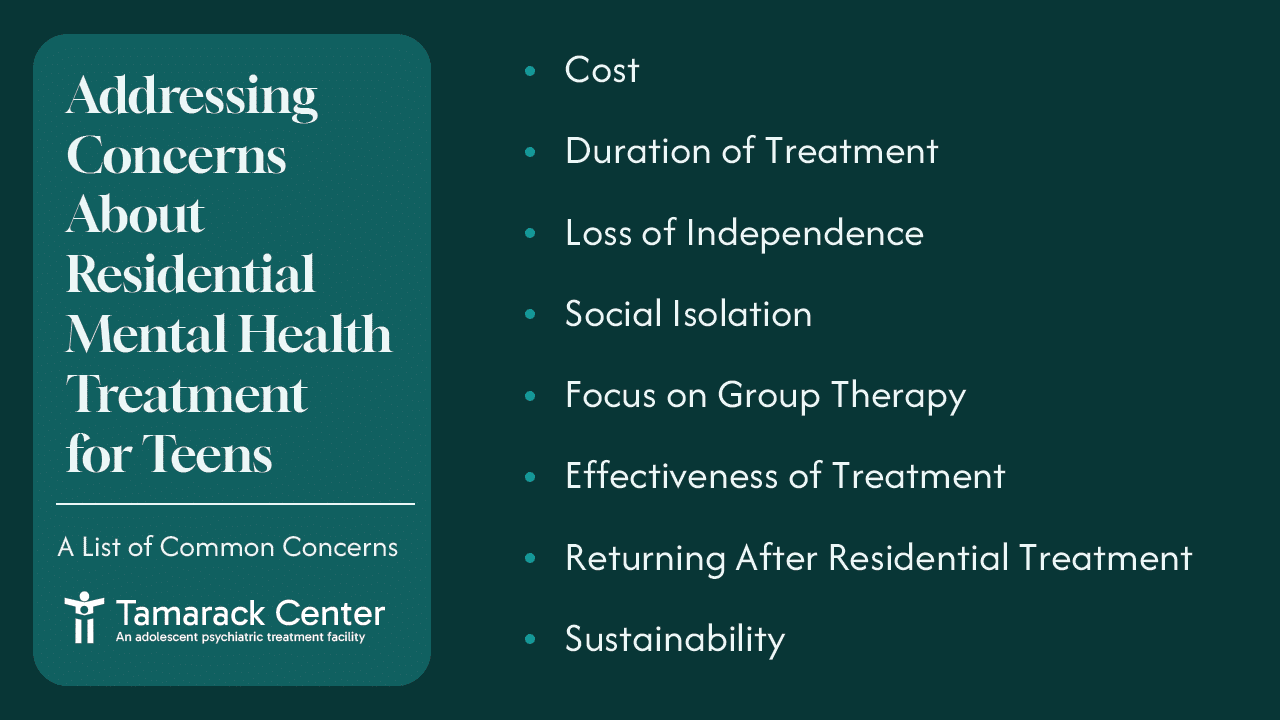Many people have only experienced mental health treatments as therapy sessions. So naturally, residential mental health treatment can bring up several concerns.
How much does it cost? How long does treatment take? How effective are residential treatment programs?
We want to address these and other concerns you may have about residential treatment programs. With a better understanding, you can better decide if residential treatment is right for your child’s circumstances.
Certain adolescents are emotionally ill-equipped for the difficult process of maturing in a complex world and they experience the world as a place of isolation and frustration. They have difficulty thinking, feeling, and taking part in activities most people take for granted. Their behavior can place tremendous strain on their families and others around them.
For adolescents like these, residential treatment offers a level of hope and recovery that can’t be matched by non-residential mental health services.
Tamarack Center has provided a quiet refuge of treatment and hope for these children and their families since 1984.
We help young people learn to break the cycle of self-destructive behaviors. Contact Tamarack Center to find out more.
8 Common Concerns About Residential Mental Health Treatment

1. Cost
At Tamarack Center, some residential beds are state-funded by Washington’s Children’s Long-Term Inpatient Program, (CLIP).
Our comprehensive, intensive treatment process also creates better outcomes in a shorter time — with reduced chances of relapse which is not only more cost-effective in the long run, but offers your child a better quality of life, faster.
2. Duration of Treatment
Many people are concerned about how long their child will need to stay at a residential treatment facility. Will it be days, weeks, or months before their child can come home and re-enter their daily life?
The duration of treatment depends on the severity and complexity of the issues a child is struggling with. Our shortest stay at Tamarack Center is 4-6 weeks. Others may take a month or more to recover, develop healthy habits, and learn how to have healthy relationships.
Every mental health journey is unique. But the goal is always to allow residents to return to their lives as soon as they can — and to do so in a healthy way.
3. Loss of Independence
Residential treatment programs usually have structured daily schedules for education, therapy, recreation, phone time, and other activities.
You may be concerned that a young person could feel a loss of independence if they’re not used to having a structured schedule.
But our residents often find comfort and safety in knowing what they’ll be doing and when. Schedules provide a routine they can rely on, which eases anxiety and uncertainty. It allows them to focus on their treatment and well-being.
Personal time is built into the schedule in limited amounts. Residents can choose what they want to do with that time. Having a reliable structure to their day puts residents at ease and makes treatments more effective.
4. Social Isolation
Having an adolescent feel isolated from friends and family is an understandable concern of residential treatment centers. Social skills are an important part of adolescent development.
For teens struggling with mental health issues, it can break the routines and habits they’ve fallen into, and allow them to focus on their well-being.
When adolescents enter a residential facility, they aren’t completely isolated. They can still connect with friends and family while in treatment. At Tamarack Center, each resident is provided with an email address. Thursday evenings are always open for family visits. As treatments progress, residents might also be given off-campus passes for time with family away from the residential facility.
At Tamarack Center, we try to give families as much access and communication with children as possible without interrupting treatment.
Your treatment team will also develop detailed discharge plans to help residents re-integrate into their old lives without slipping back into negative patterns.
5. Focus on Group Therapy
Group therapy is often a staple of residential treatment programs. This allows teens to see they are not alone in their struggles, and that others are dealing with the same issues, and helps to reduce any stigma they might feel while developing social skills. Essentially, group therapy lets them learn from their peers, develop empathy, and have an increased feeling of accountability within the group.
6. Effectiveness of Treatment
The most common question we get at Tamarack is “Does your program work?”
The answer is an enthusiastic “Yes.”
Our residential treatment programs provide multiple modalities delivered by highly trained, empathic professionals. We track data on details for each resident. We use this data to measure progress and adjust treatment to provide positive outcomes.
7. Returning After Residential Treatment
Relapses are not uncommon with mental health issues. This may be due to a lack of coping skills, treatment follow-up, and post-treatment planning.
A discharge plan is an integral part of treatment at Tamarack.
During treatment, we work with residents to develop healthy habits, relationships, and coping skills to use after they’ve left our facility. We have them practice these skills so they come more naturally once they return to their daily lives.
It’s likely your child will face some mental health challenges once they return to their pre-residential treatment lives. But treated properly, those challenges can lead to increased confidence and resilience, rather than a return to residential treatment.
8. Suitability
Residential mental health facilities are intended to treat those with severe mental and behavioral health disorders.
Tamarack Center is a residential mental health care facility focused on helping young people break the cycle of self-destructive behaviors. We require the following conditions be met before we conduct an evaluation:
- They must be medically stable.
- They are between the ages of 12 and 17.
- They must demonstrate sufficient cognitive ability to understand and participate in psycho-educational treatment in a psychiatric setting.
- They must have a full-scale IQ of 80 as a minimum.
Potential residents also need to present one (or more) of the following conditions:
- They require continuous 24-hour-a-day psychiatric supervision.
- They have been assessed to be an active danger to themselves.
- They have been assessed to have impaired reality which hinders their ability to function in daily life.
- They exhibit depressive symptoms which hinder their ability to function in daily life.
- They show evidence of a psychiatric impairment as defined in the DSM IV which prevents the youth from functioning in a less restrictive level of care.
- They are involuntarily committed according to the laws of the State of Washington.
Any of the following conditions will exclude someone from consideration at Tamarack Center:
- A potential resident cannot be so physically challenged that they cannot take basic care of themself.
- A potential resident cannot have a history or level of aggression that could compromise the safety of the facility.
- A potential resident cannot exhibit behaviors more consistent with an acute psychiatric hospital level of care.
Suitability varies between facilities based on the residential treatment options they have available.
Residential Mental Health Treatment at Tamarack Center
Tamarack Center provides effective, compassionate treatment and children’s mental health support. We provide a safe environment, structured daily schedules, and recreational activities. Our staff includes a full-time child psychiatrist, pediatrician, clinical psychologist, Master’s level therapists, and a Master’s level teacher who provides for the residents’ education during their stay. And we have access to many other local resources.
We also use evidence-based, effective treatment modalities for mental health conditions, such as Dialectical behavior therapy (DBT) and medication management when required.
Family members are an important part of our treatment team. You know your child better than anyone. Your insights and experiences play an important part in every treatment plan.
If your teen is experiencing a mental health crisis, we can help.
Is your teen struggling with mental health issues? Contact Tamarack Center to see how we can help.

